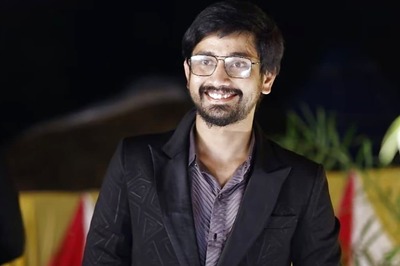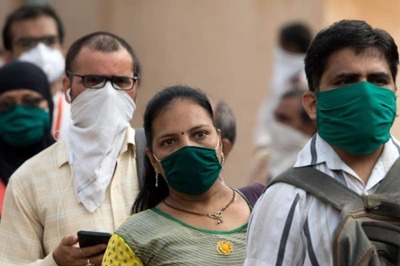
views
New Delhi: The Centre on Monday sought the Supreme Court's permission to carry out certain construction to strengthen the security of the disputed site at Ayodhya, where the idol of Lord Ram is placed.
The matter was mentioned by the Centre's counsel before a Bench of Justice K G Balakrishnan and Justice D K Jain, which posted it for hearing in the first week of August.
The Centre said the decision had been taken after discussions with the Uttar Pradesh government and various intelligence agencies.
The court's permission for carrying out any constructions in the disputed complex was needed in view of its earlier order to maintain status quo there.
Government plans to install bullet-proof steel structures around the idol at the disputed site in Ayodhya to further enhance security there in the wake of last year's terrorist attack.
Since the Supreme Court is hearing a petition on the issue of acquisition of nearly 71 acres of land by the government and has directed that status quo be maintained there, the Centre moved an application before it on May 17 seeking permission to install the temporary steel structures.
The Centre also wants to install close circuit television and set up concrete bunkers at the disputed site.
As per its plan, the square steel structures would be 11 by 11 feet and would have a height of 7-and-a-half feet. The total expenditure on further enhancing security was reported to be Rs 7.22 crore.
In the application filed in the apex court following a meeting chaired by Home Secretary V K Duggal to further scale-up security at Ayodhya, the Government has said "some measures are being planned, including providing temporary bullet-proof steel structures on the four sides of Ram Lalla (idol). The roof will be made of wood."
This was estimated to cost about Rs 9 lakh. In addition to this, the air conditioning of the make-shift area
would cost Rs 2 lakh.
Prime Minister Manmohan Singh defended the decision saying it was vital to safeguard the structure from terrorists' attack and prevent any threat to communal amity.
''If terrorists succeed in their mission to harm the disputed site in Ayodhya, it would cause enormous damage to the secular fabric of the country. It may also result into disharmony and communal tension,'' Singh told Delhi Legislative Assembly Deputy Speaker Shoaib Iqbal, who has opposed the government move.
PAGE_BREAK
Singh said the Government felt that it was paramount to protect the site and prevent terrorists from targeting it.
He, however, assured Iqbal he would convey his feelings to the Home Ministry.
The Delhi Assembly Deputy Speaker, who called on Singh to protest the government move, said the Muslim community ''very much resented the zeal of the authorities to seek approval of the Supreme Court'' to erect a bullet-proof enclosure for the idols at the disputed site.
''It is another dangerous and highly improper act of omission and commission as were those earlier blamed on the authorities for letting the idols stay in the Babri Masjid, opening of locks there,
'shilanayas' at Ayodhya and demolition of the Babri Masjid,'' he said in a memorandum to the Prime Minister.
Iqbal also sought PM’s intervention in the matter to ''redress the grievances'' of the minority community.
The Deputy Speaker had earlier met the Prime Minister on May 12 in connection with the problems being faced by the Muslims in offering 'Namaz' in the historical mosques in the capital, which are under
the control of the Archaeological Survey of India (ASI).
In this connection, he urged PM to allow some Imams to look after the mosques, on the plea that it would be in tune with religious sentiments of the Muslim community.
Iqbal said a total of 53 historical mosques in Delhi are under the control of the ASI. ''On Fridays and on some other occasions, Muslims are compelled to offer 'namaz' on roads, pavements and in parks because the ASI is preventing them for using these mosques.''
He also drew attention to the fact that under Rule 7, sub-rule-2 of the Ancient Monument and Archaelogical Sites and Remains Rule, 1959, no prohibition applied in case of customary and recognised religious acts.



















Comments
0 comment